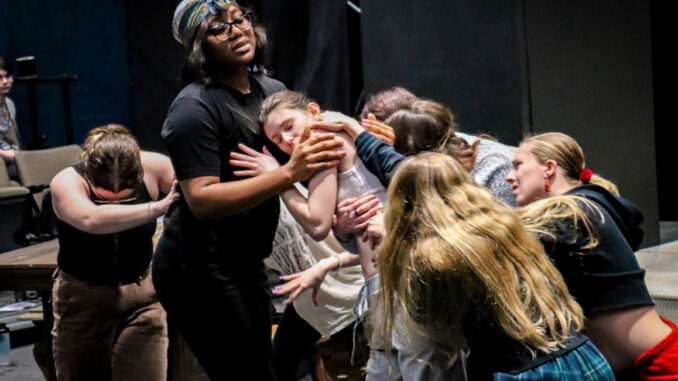
Naomi Girson | Staff Writer
In the atrium of the Genesius Theater, through the large glass walls, Susan Betten and Julian Cerminara are practicing their lines. The director sits, watching silently, and confirming every word they say. As they rehearse, the words get louder, more powerful. By the end of the rehearsal, Betten is screaming, and her counterpart is close to tears. The director tells Betten, “this needs to be the most definitive line of the whole play.”
On Feb. 8, Medea, a modern retelling of the Greek tragedy, will debut at the Genesius Theater, starring Betten as the mythical granddaughter of the sun god Helios — Medea.
Inspired by both the Euripides and Judith Anderson versions of the theatrical production, it features fluid dance breaks and revised dialogue.
Betten has spent almost a year working toward this opening night and is not only starring but producing and directing the production. In 2023 she even won the English Department’s O’Donnell Award through the immense research she did for her capstone project, allowing her to pursue “Medea” even further afterward.
Last summer, Betten spent time in New York at the Public Library archives, looking at ancient Greek artifacts as well as the real scripts from the Judith Anderson screenplay of Medea.
Research-based performance is a passion of Betten’s and she finds the idea of her character extremely enthralling, especially the parts of her story that are controversial and tragic.
The story, according to Betten’s vision, is supposed to elicit strong emotions.
“I kind of want you to leave the theater and feel sick to your stomach. Like sort of just go home and then just lay in your bed and not stop thinking about it,” Betten said.
“I think that’s my goal with it because it’s unsettling having it be in front of you, as a live performance is so impactful too because it’s not like you’re watching it over a screen. It’s not like you’re reading about it. It’s not like someone’s telling you about it. It’s like a way you’re seeing it, and it’s the nature of the story, but you don’t know what’s happening next.”
The play’s theme is about feminine rage as Medea, a misunderstood mistress, murders her ex-lover’s children after he abandons her. The Greek tragedy has been around since 431 BC. The Greek tragedy was originally written at a time when not many women had stories about them. It was even less common for stories to spotlight female leads for the terrible or negative actions. Since then, the production has gone through countless rewrites, translations and adaptations.
Sarah Miller, a professor in the classics department at Duquesne, taught Betten and her castmate Cerminara in her mythology class. They read Medea together in her class.
“She’s a hero, but she can’t be a regular hero. So she has to go about things in her own way,” Miller said.
Cerminara, who plays Jason, Medea’s ex-lover, felt that the epitome of Medea was feminine empowerment.
“I keep wondering to myself if this was female empowerment to the Greeks as well,” Cerminara said. “This could have been a Greek comedy, and to us it’s like the greatest tragedy.”
Miller hopes some of the play’s original lines make it into Betten’s adaptation because they point out the difficulty with being a mother and compare women’s personal struggle to a man’s on the battlefield.
Betten stressed that during production it was important to think about what the show meant as it came to fruition. The goal is to raise questions of accountability and sympathy, leaving you with that unsettled feeling as you leave.
Despite also being the costume designer on the project, Betten said the hardest part of the role is not to look nice while portraying Medea. She struggles to not be consumed with thoughts of how the audience will perceive her. But in order to be Medea, Betten said she has to be raw and real.
“It needs to be like how I feel it and that needs to happen because no one’s going to leave the theater feeling the way I want them to feel if I look lovely and appealing,” Betten said.
After opening night on Feb. 8, the show will run until the 18th. To purchase tickets visit https://www.duqredmasquers.com/purchase-tickets.
“I

